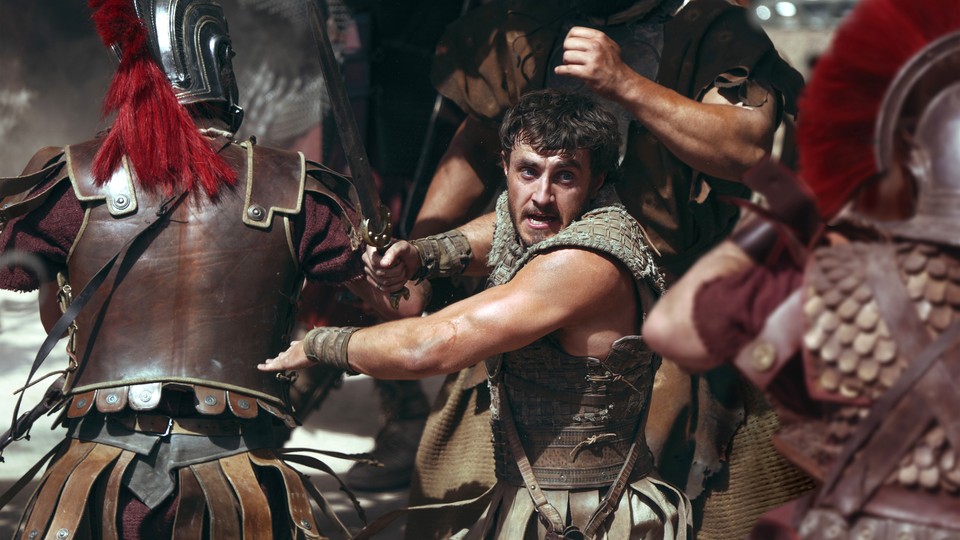That’s Right, Ridley Scott Put Sharks in the Colosseum
4 min read
Long before “thinking about the Roman empire” became shorthand for having a hyper-fixation, Ridley Scott turned the actual Roman empire into a mainstream obsession. In 2000, the director’s sword-and-sandal blockbuster Gladiator muscled its way into becoming that year’s second-highest-grossing film, before winning the Academy Award for Best Picture and cementing its status as—I’m just guessing here—your dad’s favorite movie of all time. “Are you not entertained?!” Russell Crowe’s Maximus goaded the crowd in a memorably rousing scene. We really were: Here was an almost absurdly simple tale of revenge that Scott, via visceral fight scenes (and real tigers), turned into a maximalist epic.
For Gladiator II, now in theaters, Scott has somehow taken it a step further. The sequel has twice as many heroes to root for and twice as many emperors to root against, plus a wild card in the form of Denzel Washington’s conniving arms dealer, Macrinus. In lieu of tigers, battles in the arena now involve a menagerie of baboons, sharks, and a rhino. Even the opening credits have been designed to excite the audience: Key scenes from the previous filmare animated in a painterly sequence, which lands on a title card that stylizes the sequel’s name as, gloriously, GLADIIATOR. It’s so grandiose, the audience at my screening started applauding before a single fight had begun.
Set 16 years after the events of Gladiator, the sequel follows Lucius (Paul Mescal), the son of Maximus and Lucilla (Connie Nielsen, reprising her role). Lucilla secretly sent the young Lucius away to the kingdom of Numidia for his protection after Maximus’s death. In the years since, a lot has happened, which we learn through overly ornate flashbacks and exposition. Lucius has come to resent his homeland and his mother, given their time apart. That resentment grows into rage after Roman forces, led by Lucilla’s new husband, General Marcus Acacius (Pedro Pascal), conquer Numidia in an opening battle that leads to Lucius’s wife’s death. In Rome, meanwhile, a pair of snotty brothers named Geta (Joseph Quinn) and Caracalla (Fred Hechinger) have become co-emperors. Their reckless leadership has inspired a resistance led by Lucilla and Acacius, and turned the city into fertile ground for the rise of opportunistic power players such as Macrinus.
The plot, packed with so many shadowy conspiracies and cunning characters, is far less straightforward than the one in Gladiator, to its detriment. But amid the bloat, Scott homes in on how the cycle of ambition and retribution can be hard to break. Bloodshed is the cause and effect of every twist in the story, the reason behind Rome’s tumult and the apparent solution to its woes. Violence demands the spotlight, and Gladiator II draws tension from the fact that many of its characters can’t escape their attraction to brutality. In Scott’s hands, ancient Rome has never been more ruthless—or more exhilarating to watch.
The director is a master at pulling elegance out of rough-and-tumble set pieces. During the assault on Lucius’s home, embers swirl like snow, flecks of water and mud smack into the camera lens, and every strike of a sword or blow of a fist lands with primal intensity. Inside the Colosseum, despite the noticeably heavy use of CGI, Scott finds striking images in the chaos: A pool of blood blossoms underwater. An arrow zips across the field. A gladiator tosses sand into the air. These shots are mesmerizing for the viewer, and convey the strange allure of battle for the combatants themselves.
These energetic fight scenes are matched by a collection of flashy performances, with those playing the villains stealing the show. Mescal and Pascal embody their roles’ gravitas and become almost feral when they’re forced into the Colosseum. But Quinn and Hechinger have much more fun leaning into their characters’ boyish petulance, echoing Joaquin Phoenix’s work as the man-child emperor, Commodus, from Gladiator. Washington, however, runs away with the movie: Armed with a Cheshire-cat grin, heaps of jewelry, and seemingly limitless glasses of wine, Macrinus toys with Rome like it’s a massive chessboard full of pawns, and the actor embraces the script’s numerous swerves. He imbues the character with an infectious glee in every scene, whether he’s cheering on the men cutting one another down inside the arena or quietly attempting to manipulate Lucius into doing his bidding.
For all the fun it’s having, Gladiator II does require a working knowledge of its predecessor’s story to understand the stakes, which also means it magnifies the original film’s flaws. The characters are more thinly drawn, with shallow motivations in spite of the plot’s contrivances. The dialogue is more stilted, packed with pat observations about the “dream of Rome” in the face of an empire that repeatedly fails to learn its lesson. And the ending puts forth the vague notion that Rome’s future relies on unifying its people—an earnest sentiment, maybe, but a rather dull conclusion to reach after two hours of savagery.
Then again, Gladiator II doesn’t claim to offer anything more than pure spectacle. The finale gestures at the idea that hope is its own form of power, but even Lucius admits to its limits as a peacekeeping force. “You look to me to speak,” Lucius says as he addresses opposing armies about to fight. “I know not what to say.” Maybe Macrinus, who believes that Rome is doomed to brutality and bloodshed, has a point when he asserts that violence is “the universal language.” After all, to borrow a revered gladiator’s words, it’s undeniably entertaining.



